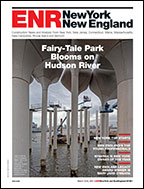With weekly rail ridership back to about 50% of the pre-pandemic level, New Jersey Transit is forging ahead with its ambitious multi-billion capital improvement program aimed at fast-forwarding the nation’s third-largest public transit agency’s infrastructure into the 21st century.
Despite the dip in farebox revenue as COVID-19 lockdowns and other restrictions kept most passengers off its trains and buses, NJ Transit has continued to pursue a five-year capital plan it announced last June, President and CEO Kevin Corbett told attendees of a July 23 Transportation Research Forum webinar sponsored by its New York area chapter.
While many New York City region major employers are welcoming employees back to their offices, Corbett expects it will be 2026 before NJ Transit ridership is fully restored.
Corbett reported that the agency has about $4 billion of projects active or in the pipeline, including replacement of the 110-year-old Portal Bridge rail span across the Hackensack River near Secaucus, N.J. The collaboration with Amtrak to eliminate the longstanding bottleneck received a boost earlier this year with a $766-million federal grant, enabling NJ Transit to get the construction bid process underway. The agency expects to award the contract this fall.
Corbett also provided updates on other major NJ Transit projects, including the initial phase of the $600-million Raritan River Bridge between Perth Amboy and South Amboy and the $195-million Long Slip Fill and Enhancement project in Jersey City that is adjacent to the Hoboken Rail Yard. He noted that the agency still needs $5 billion to fully fund its capital plan but is hopeful that infrastructure measures being debated in Congress will help fill the gap.
The agency''s board on June 21 approved a $15-billion capital plan, but it faces loss of about $361 million this year due to funding diversion to the NJT operating budget, says northjersey.com.
Following up on meeting last year’s federal deadline for implementing positive train control (PTC), Corbett said NJ Transit is now taking a leading role with regulators and major freight railroads to establish a national standard for PTC technology. He said such a standard will enhance existing safety benefits while also making system operation more efficient and cost-effective.





Post a comment to this article
Report Abusive Comment